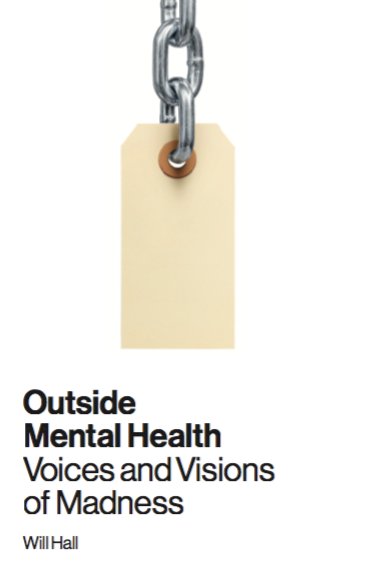Violent Voices: Erica van den Akker
First Aired: 04-02-2010 -- 8 comments | Add comment

People who hear voices are no more violent than anyone else — but what about the small number of voice hearers that do actually commit violent crimes? Are medications and locked wards the best way to help those who act on their aggressive “command hallucinations?” What is the relationship between trauma, violence, and voices?
Dutch psychiatric social worker and Hearing Voices Movement member Erica van den Akker discusses her innovative counseling work with violent offenders in the Netherlands.
alpouvar1(at)tomaatnet(dot)nl
Podcast: Play in new window | Download (Duration: 48:28 — 44.4MB)
Subscribe: RSS



























 Creative Commons 2.5 copyright
Creative Commons 2.5 copyright
Here are extracts from two letters I wrote to Erica after I listened to her informing and inspiring interview with Will Hall. Her interview profoundly shifted my thinking around my partner John’s experience and gave me some valuable insight. It also gave me hope and light at the end of a very long, dark and confusing tunnel and provided me with renewed understanding and energy.
Dear Erica,
I have just listened to your amazing interview about the wonderful work you are doing with voices, particularly violent voices (violence trauma). Your description of someone who hears voices but keeps it to themselves has struck a chord with my partner’s case.
John has spent over four years in a maximum-security forensic psychiatric setting. I have been advocating for him for a long time now and trying to find the right approach for him. He trusts me but doesn’t trust easily and has a history of violence with nursing staff, though he hasn’t committed crimes in the wider community. My experience of John is that he’s a gentle and loving man. Forced treatment does not suit him (who does it suit?) but he abstains from responsibility and finds it difficult to cope. He has been heavily medicated. When you described that distracted quality along with a love of music as a possible sign that someone is hearing voices, my gut knew that John hears voices, though he denies this. It describes him perfectly.
I am passionate about helping John. We have a son Joshua together and he is nearly 4. I was 2 months pregnant when John was sectioned. John is a very good man who has been to hell and back a few times.
Marion Aslan and Mike Smith of Elemental and Crazydiamond in the UK made a video for John’s campaign. I have found a lot more progressive support in the UK and USA. I just wanted to let you know how much your interview with Will Hall inspired me and how you have given me much more clarity around John’s experience. I believe he is hearing voices but will not open up about it. I believe these voices are related to deep-seated trauma from a violent childhood. Your talk has provided me with the last piece of the puzzle, I think.
Thank you for your profoundly loving work. You are an inspiration.
Much love and thanks from Ireland,
Grainne Humphrys.
Dear Erica,
I used your line “I know that you hear things that I don’t hear” with John yesterday and he has opened up to me and says he sometimes hears voices. This is a breakthrough. He says he loves me but I suspect that the voices don’t love me, which is why I see him struggling around me sometimes (distracted quality). I could not put my finger on it before but you have clarified something for me.
In the past when I have enquired about John hearing voices, he has been resistant to my query (probably it was the way I worded it, that and a combination of fear). I have often reassured him that it’s fine to hear voices, they need to be heard, they have something to say, it makes sense, you don’t have to let them control you etc. I have taken Peter Bullimore, Dean Smith and Brian Hartnett (all voice-hearers) into meet him but still he couldn’t open up.
But that sentence, Erica, has done it. Thank you. I know that John is, at times, terrified of his voice/s now. He hallucinates. It all makes sense to me now.
I think now I will learn how to communicate with these voices. Perhaps Mike Smith and Marian Aslan can train me.
Much love, Grainne.
Dear Grainne thank you so much for posting your experiences and point of vieuw here on this site. I can only say that I am gratefull that you took the time to listen to my words, that is what we need, that we listen to each other instead of judging. it gives me hope for the kind of work we do and for the future. As you know by now, I did write a letter to your partner John, I hope that more people can get some inspiration by your and my words. Take care
erica
As Will said in the beginning, I am psychiatric social worker,( so no psychologist as writen above) so in general I work there to take care of the daily things, talk with them about their wishes for the future, the way how we can make these “dreams” come true, talk about what options there are etc. They can “choose” to talk to me, but they are not obliged, though they are obliged to follow the instructions which are described in their personal treatment plans ( which I wrote together with them )
But I totally agree with the comment, I have also said that I get angry that I have to call them clients when I am not able to treat them as a client, with their wishes and help them to realise their dreams.
I have always asked why there is no sort of board of clients, so that in the case of vacancies they also have a vote in which applicant they would like to see working there. Unfortunately all those kind of things seem impossible ( and I still don’t know why).
Erica was a good guest, I enjoyed it far more than the previous show about prisons.
I will say I don’t like anyone using the word ‘client’ in reference to people that essentially have not contracted voluntarily with the service provider. A prisoner in a psychiatric facility, a ‘forensic setting’, has little to no choice about what sort of personnel come to provide ‘services’, whether they be innovative counseling like this, or forced drugging. I will say, the detainees Erica worked with really lucked out. It seems as though she did some great work.
Erica writes that she won the court case against her employer, who dismissed her because of her innovative work with voice-hearers who have committed violent crimes. Congratulations Erica!
HI !!!
In the name of SnowVhite GbR we send congratulation to the Netherlands, to have found the way back to human rights.
We think it is not appropriate for a modern health system to fire one of their best fighters for civil rights practising unconventionel methods which seem to be rather inconvenient.
Erica – sorry to hear about this… .
A message from a voice – hearer from Germany (Remember the congress in Neukölln 2009 (-we had a drink at “Ricks Cafe”))
see: http://www.SnowVhite.eu
Hoi Erica hoe is het met jou? Lang geleden dat we wat van elkaar gezien en gehoord hebben. Ik had het net met mijn man over vroeger en toen kwam jij natuurlijk ook ter sprake. Ben even gaan googelen en kwam op deze site uit. Heb hem nog niet helemaal doorgelezen, maar begrijp dat je nu een psychriatrisch sociaal werker bent. Ik hoop van je horen. Groetjes Christine van Rijnbach
ha Christine, wat bijzonder je via deze weg te vinden! Will Hall wees me op jouw bericht hier. Je kunt me als je wilt, bereiken op email: alpouvar1@gmail.com
hartelijke groet,
Erica